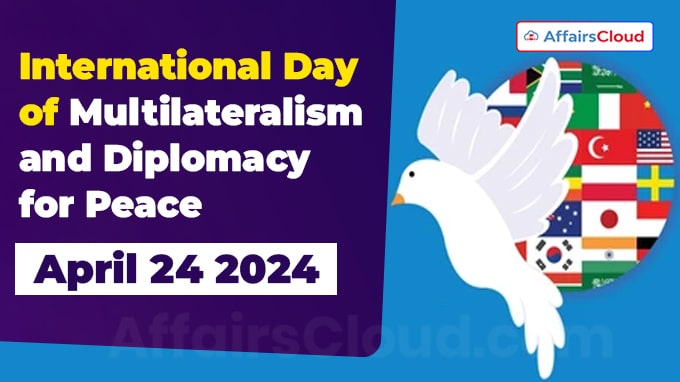 The United Nations (UN)’s International Day of Multilateralism and Diplomacy for Peace is annually observed across the globe on 24th April to promote the values of multilateralism and international cooperation, which are fundamental principles of the UN Charter, and to achieve the 2030 Agenda for Sustainable Development.
The United Nations (UN)’s International Day of Multilateralism and Diplomacy for Peace is annually observed across the globe on 24th April to promote the values of multilateralism and international cooperation, which are fundamental principles of the UN Charter, and to achieve the 2030 Agenda for Sustainable Development.
- The Day acknowledges the role of multilateral decision-making and diplomacy in achieving peaceful resolutions to conflicts among nations.
Significance:
i.This Day emphasises the importance of diplomatic engagement and multilateral action in addressing global issues like climate change, poverty, and conflict.
ii.The Day also aims to support and advance the 3 pillars of the UN – Peace and Security, development, and Human rights.
Background:
i.On 12 December 2018, the United Nations General Assembly (UNGA) adopted a resolution A/RES/73/127 proclaiming the 24th April of every year as the International Day of Multilateralism and Diplomacy for Peace, with effect from the 73rd session of the General Assembly.
ii.The International Day of Multilateralism and Diplomacy for Peace was 1st observed on 24th April 2019.
2030 Agenda for Sustainable Development:
i.It is a roadmap for world leaders to achieve 17 Sustainable Development Goals and 169 targets by 2030 to end poverty, protect the planet, and address inequalities
ii.SDGs also known as the Global Goals, were adopted by the UN in 2015 as a universal call to action and came into effect on 1 January 2016.
UN Charter:
UN Charter is a multilateral international treaty that establishes the UN as an international organization.
It states that the purposes and principles is the commitment to settle disputes through peaceful means.
Global Commitment to Peace:
i.World leaders reaffirmed their commitment to multilateralism and international peace and security during the 2018 General Debate.
ii.This commitment was strengthened during the High-level Dialogue on Renewing the Commitment to Multilateralism held on 31 October 2018.
What is Multilateralism?
i.Multilateralism defined in contrast to bilateralism and unilateralism, signifies cooperation involving at least 3 states.
ii.Multilateralism is based on founding principles such as consultation, inclusion, and solidarity.
iii.It operates through collectively developed rules for sustainable and effective cooperation.
iv.It serves as a cooperative approach and a form of organisation in the international system.
UN Summit of the Future:
i.The UN will convene a Summit of the Future: Multilateral Solutions for a Better Tomorrow from 22-23 September 2024.
ii.It is a high-level event bringing together UN Member States, UN agencies, and other organizations to reassert their commitments to peace, sustainable development, and human rights.
iii.The Summit seeks to establish a fresh global consensus on the vision for our future and the actions needed to realise it.




